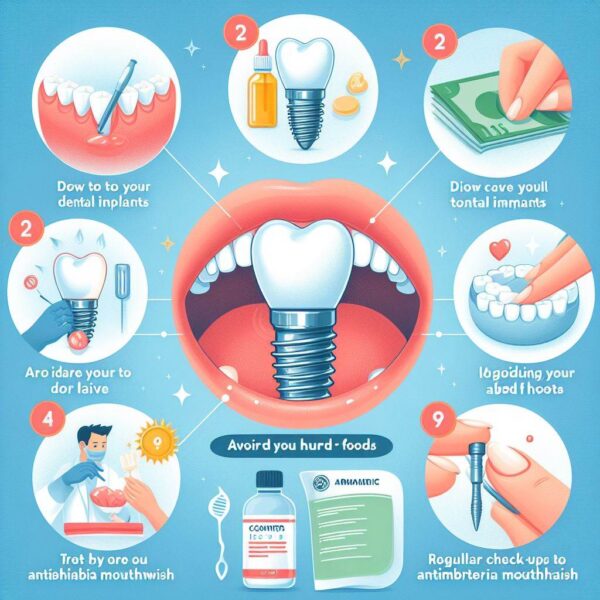
After undergoing a dental implant procedure, proper care is essential to ensure the longevity and success of the implant. Dental implants are a valuable investment in restoring functionality and aesthetics to your smile, and maintaining them requires diligence and attention to oral hygiene.
Understanding how to care for a dental implant is vital for minimizing the risk of complications and maximizing the lifespan of the implant. In this article, we’ll explore the key steps and considerations involved in caring for a dental implant, from immediate post-operative care to long-term maintenance.
By following these guidelines and incorporating good oral hygiene practices into your routine, you can help ensure the continued health and stability of your dental implant for years to come.
How To Care For A Dental Implant
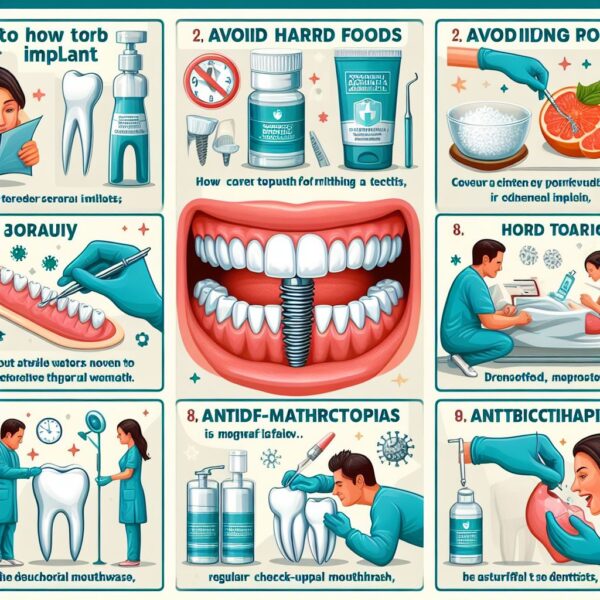
1. Follow Post-Operative Instructions:
After implant surgery, your dentist will provide specific instructions for post-operative care, including guidelines for managing discomfort, swelling, and bleeding. It’s essential to follow these instructions closely to promote proper healing and minimize the risk of complications.
2. Maintain Good Oral Hygiene:
Proper oral hygiene is crucial for preventing infection and maintaining the health of surrounding tissues. Brush your teeth at least twice a day with a soft-bristled toothbrush and fluoride toothpaste, paying close attention to the area around the implant. Use a nylon-coated interdental brush or floss to clean between teeth and around the implant crown.
3. Avoid Tobacco Use:
Tobacco use, including smoking and chewing tobacco, can significantly increase the risk of implant failure and complications such as infection and poor healing. If you smoke, consider quitting or reducing your tobacco use to improve the long-term success of your dental implant.
4. Monitor for Signs of Complications:
Keep an eye out for signs of potential complications, such as persistent pain, swelling, redness, or discharge around the implant site. Contact your dentist immediately if you experience any unusual symptoms or concerns.
5. Attend Regular Dental Check-Ups:
Regular dental check-ups are essential for monitoring the health and stability of your dental implant. Your dentist will examine the implant site, assess the condition of surrounding tissues, and perform professional cleanings to remove plaque and tartar buildup.
6. Protect Against Teeth Grinding:
If you have a history of teeth grinding or clenching (bruxism), discuss this with your dentist. Teeth grinding can exert excessive force on dental implants, increasing the risk of implant failure or damage. Your dentist may recommend wearing a nightguard to protect your implant while you sleep.
7. Eat a Healthy Diet:
A balanced diet rich in fruits, vegetables, lean proteins, and whole grains provides essential nutrients for oral health and overall well-being. Avoid hard or sticky foods that can exert excessive force on the implant and surrounding tissues.
8. Be Mindful of Implant-Safe Products:
Some oral hygiene products, such as toothpaste containing abrasive ingredients or mouthwash containing alcohol, may be too harsh for dental implants and could potentially damage them.
9. Address Any Dental Issues Promptly:
If you experience any dental issues, such as tooth decay, gum disease, or damaged restorations, seek prompt treatment from your dentist. Untreated dental problems can compromise the health and stability of your dental implant.
10. Maintain Overall Health:
Maintaining good overall health, including managing chronic conditions such as diabetes or hypertension, can contribute to the success of your dental implant. Be sure to inform your dentist of any changes in your health status or medications. I hope now you gotten the question how to care for a dental implant and its complete answer.
8 Tips For The Maintenance Of Dental Implants

Maintaining dental implants is crucial for ensuring their longevity and preserving oral health. Dental implants offer a durable and natural-looking solution for replacing missing teeth, but they require proper care and maintenance to remain in optimal condition.
By following specific guidelines and incorporating good oral hygiene practices, individuals can extend the lifespan of their dental implants and reduce the risk of complications. In this article, we’ll explore eight essential tips for the maintenance of dental implants, from practicing proper oral hygiene to avoiding habits that can compromise implant health.
Understanding these tips and implementing them into your daily routine can help you enjoy the benefits of your dental implants for years to come, promoting overall oral health and well-being.
8 Tips For Maintenance Dental Implant:
1. Commit to Excellent Oral Hygiene:
Maintaining excellent oral hygiene is paramount for the longevity of dental implants. Brush your teeth at least twice a day with a soft-bristled toothbrush and fluoride toothpaste, paying particular attention to the area around the implant and along the gumline.
2. Use Interdental Cleaning Devices:
In addition to brushing, use interdental cleaning devices such as floss, interdental brushes, or water flossers to clean between teeth and around the implant crown. Removing plaque and food debris from these areas helps prevent gum disease and implant complications.
3. Attend Regular Dental Check-Ups:
Regular dental check-ups are essential for monitoring the health and stability of dental implants. Your dentist will assess the condition of the implant and surrounding tissues, perform professional cleanings, and address any concerns or issues that arise.
4. Avoid Tobacco Products:
Tobacco use, including smoking and chewing tobacco, can significantly increase the risk of implant failure and complications such as infection and poor healing. If you use tobacco, consider quitting or reducing your consumption to protect your dental implants.
5. Protect Against Teeth Grinding:
If you have a history of teeth grinding or clenching (bruxism), discuss this with your dentist. Teeth grinding can exert excessive force on dental implants, leading to implant failure or damage. Your dentist may recommend wearing a nightguard to protect your implants while you sleep.
6. Be Mindful of Dietary Choices:
Certain foods and beverages can pose a risk to dental implants. Avoid hard or sticky foods that can exert excessive force on the implant and surrounding tissues. Additionally, limit consumption of sugary or acidic foods and beverages, as they can contribute to plaque buildup and gum disease.
7. Use Implant-Safe Oral Care Products:
Choose oral care products specifically formulated for dental implants, such as low-abrasive toothpaste and alcohol-free mouthwash. These products are gentler on implants and help maintain their integrity without causing damage.
8. Stay Informed and Communicate with Your Dentist:
Stay informed about proper implant care and maintenance guidelines, and communicate openly with your dentist about any concerns or questions you may have. Your dentist can provide personalized recommendations and address any issues that arise to ensure the continued health and stability of your dental implants.
What Is Dental Implant
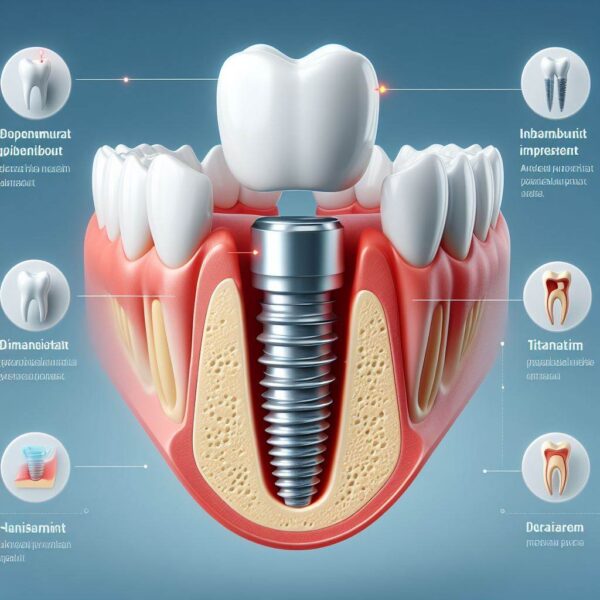
A dental implant is a modern and sophisticated solution for replacing missing teeth, offering a durable and natural-looking alternative to traditional prosthetics. Designed to mimic the function and appearance of natural teeth, dental implants provide a stable foundation for crowns, bridges, or dentures, restoring both aesthetics and functionality to the smile.
Understanding what a dental implant entails, including its components, placement process, and benefits, is essential for individuals considering this treatment option. In this article, we’ll explore the concept of dental implants in detail, shedding light on their structure, function, and the transformative impact they can have on oral health and quality of life.
By gaining insight into the world of dental implants, individuals can make informed decisions about their dental care and explore the possibilities for restoring their smiles with confidence.
Understanding Dental Implant:
A dental implant is a prosthetic device that serves as a replacement for a missing tooth root. Unlike traditional prosthetics such as bridges or dentures, which sit on top of the gums, dental implants are surgically implanted into the jawbone, providing a stable foundation for replacement teeth.
The typical dental implant consists of three main components: the implant fixture, abutment, and prosthetic crown. The implant fixture is a small, screw-like titanium post that is surgically placed into the jawbone. Over time, the implant fixture fuses with the surrounding bone through a process called osseointegration, providing a secure anchor for the replacement tooth.
Once osseointegration has occurred, an abutment is attached to the implant fixture. The abutment serves as a connector between the implant fixture and the prosthetic crown, which is custom-made to match the color, shape, and size of the natural teeth. The prosthetic crown is then attached to the abutment, completing the restoration and restoring the appearance and function of the missing tooth.
The placement process for dental implants typically involves multiple stages, including an initial consultation, implant placement surgery, healing period, abutment placement, and crown attachment. While the process may take several months to complete, the result is a permanent and durable solution for replacing missing teeth.
One of the primary benefits of dental implants is their ability to preserve bone health and prevent bone loss in the jaw. When a tooth is lost, the underlying bone can deteriorate over time due to lack of stimulation. Dental implants mimic the function of natural tooth roots, providing the necessary stimulation to maintain bone density and prevent resorption.
Why Is Dental Implant Important
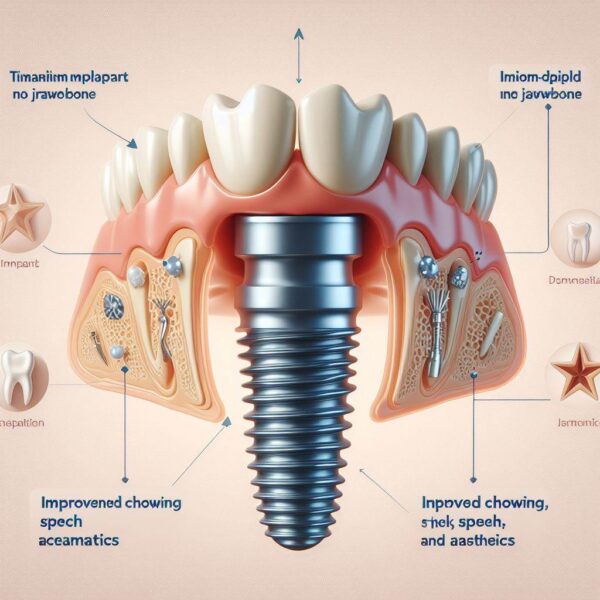
In the realm of modern dentistry, dental implants stand as a cornerstone of innovation, offering a profound solution for individuals grappling with tooth loss. Beyond mere cosmetic enhancement, dental implants play a pivotal role in restoring oral function, preserving jawbone integrity, and bolstering overall oral health.
Grasping the significance of dental implants entails understanding their far-reaching benefits, including their ability to prevent bone resorption, provide stable tooth replacement, and enhance the quality of life for those who undergo the procedure. In this article, we’ll delve into the pivotal importance of dental implants, unraveling the layers of their impact on oral health and well-being.
By comprehending the vital role dental implants play in modern dentistry, individuals can make informed decisions about their dental care and embrace the transformative potential of this innovative treatment option.
Exploring Dental Implant Importance:
1. Preservation of Jawbone:
Dental implants mimic natural tooth roots, providing essential stimulation to the jawbone and preventing bone loss, which can occur after tooth loss.
2. Stability and Functionality:
Unlike traditional prosthetics like dentures, dental implants are securely anchored in the jawbone, offering stability and functionality akin to natural teeth.
3. Enhancement of Aesthetics:
Dental implants seamlessly blend with natural teeth, restoring a natural appearance and boosting confidence in one’s smile.
4. Prevention of Facial Structure Changes:
By preserving bone density and supporting facial muscles, dental implants help prevent the collapse of facial structure and the appearance of premature aging.
5. Improved Oral Health:
Dental implants promote better oral health by preventing adjacent teeth from shifting and reducing the risk of gum disease and decay.
6. Long-Term Solution:
With proper care, dental implants can last a lifetime, making them a durable and reliable solution for tooth replacement.
7. Enhanced Quality of Life:
The stability, functionality, and natural appearance of dental implants allow individuals to enjoy a varied diet, speak confidently, and engage in social activities without restrictions.
8. Restoration of Self-Confidence:
Dental implants not only restore oral function but also restore self-confidence, allowing individuals to feel comfortable and proud of their smiles once again.
9. Versatility:
Dental implants can be used to replace single teeth, multiple teeth, or even provide support for full arch dental prostheses, offering versatile solutions for various tooth loss scenarios.
10. Innovation in Dentistry:
As a testament to ongoing advancements in dental technology, dental implants represent a cutting-edge solution that continues to evolve and improve, offering hope and restoration to countless individuals worldwide.
Why People Have Dental Implant

The decision to undergo dental implant surgery is often driven by a myriad of factors, ranging from functional concerns to aesthetic desires. Dental implants offer a comprehensive solution for individuals grappling with tooth loss, providing stability, durability, and natural-looking results.
Understanding why people opt for dental implants involves delving into the various motivations behind this choice, including the desire to restore oral function, preserve jawbone integrity, and regain confidence in one’s smile.
In this article, we’ll explore the multifaceted reasons why people choose dental implants, shedding light on the diverse array of benefits and the transformative impact this treatment option can have on individuals’ lives.
By gaining insight into the motivations behind dental implant surgery, individuals can make informed decisions about their oral health and embark on a path toward a brighter, healthier smile.
Reason For People Have Dental Implants:
Replacement of Missing Teeth:
Dental implants serve as a reliable solution for replacing missing teeth, restoring oral function and enabling individuals to chew, speak, and smile with confidence.
Enhancement of Aesthetics:
Dental implants provide a natural-looking replacement for missing teeth, seamlessly blending with existing teeth and enhancing the overall appearance of the smile.
Prevention of Bone Loss:
By mimicking the function of natural tooth roots, dental implants stimulate the jawbone and prevent bone loss, preserving facial structure and preventing the collapse of facial muscles.
Improved Oral Health:
Dental implants help maintain optimal oral health by preventing adjacent teeth from shifting out of alignment, reducing the risk of gum disease, decay, and further tooth loss.
Enhanced Comfort and Stability:
Unlike traditional prosthetics like dentures, dental implants are securely anchored in the jawbone, offering stability and comfort comparable to natural teeth.
Long-Term Durability:
With proper care and maintenance, dental implants can last a lifetime, providing a durable and reliable solution for tooth replacement.
Restoration of Confidence:
Dental implants restore confidence and self-esteem by addressing the physical and emotional impact of tooth loss, allowing individuals to smile and socialize without self-consciousness.
Preservation of Speech:
Missing teeth can affect speech clarity and pronunciation. Dental implants restore proper tooth alignment and enable individuals to speak clearly and effectively.
Customized Treatment:
Each dental implant treatment plan is tailored to the individual’s unique needs and goals, ensuring personalized care and optimal outcomes for every patient.
How Can I Make My Dental Implant Heal Faster?

The journey to dental implant recovery involves patience and diligence, as the healing process plays a crucial role in the long-term success of the implant. While proper care and post-operative instructions are essential, individuals may wonder if there are ways to expedite the healing of their dental implant.
Understanding how to promote faster healing can help individuals navigate the recovery process with confidence and optimize their chances of achieving successful outcomes. In this article, we’ll explore strategies and techniques to facilitate the healing of dental implants, from lifestyle adjustments to dietary considerations.
By incorporating these practices into their post-operative routine, individuals can support the body’s natural healing mechanisms and promote faster recovery following dental implant surgery.
Understanding To Heal Dental Implant:
1. Follow Post-Operative Instructions:
Adhere to the post-operative instructions provided by your dentist or oral surgeon, including guidelines for medication, oral hygiene, and activity restrictions.
2. Manage Discomfort:
Take prescribed pain medication as directed to manage discomfort and promote relaxation during the initial healing phase.
3. Practice Good Oral Hygiene:
Maintain good oral hygiene by gently brushing and flossing the teeth adjacent to the implant, being careful to avoid disturbing the surgical site.
4. Avoid Tobacco and Alcohol:
Refrain from smoking and limit alcohol consumption, as these habits can impair circulation, delay healing, and increase the risk of complications.
5. Eat a Nutritious Diet:
Consume a balanced diet rich in vitamins, minerals, and protein to support the body’s healing processes and promote tissue regeneration.
6. Stay Hydrated:
Drink plenty of water to stay hydrated and facilitate the transport of nutrients and oxygen to the healing tissues.
7. Limit Physical Activity:
Avoid strenuous physical activity and heavy lifting during the initial healing period to minimize the risk of bleeding, swelling, and implant displacement.
8. Get Adequate Rest:
Prioritize rest and relaxation to allow the body to devote energy to the healing process and promote faster recovery.
9. Avoid Chewy or Hard Foods:
Stick to soft, easily digestible foods during the first few days after surgery to minimize irritation to the surgical site and promote comfort.
What Is The Best Way To Clean Dental Implants?
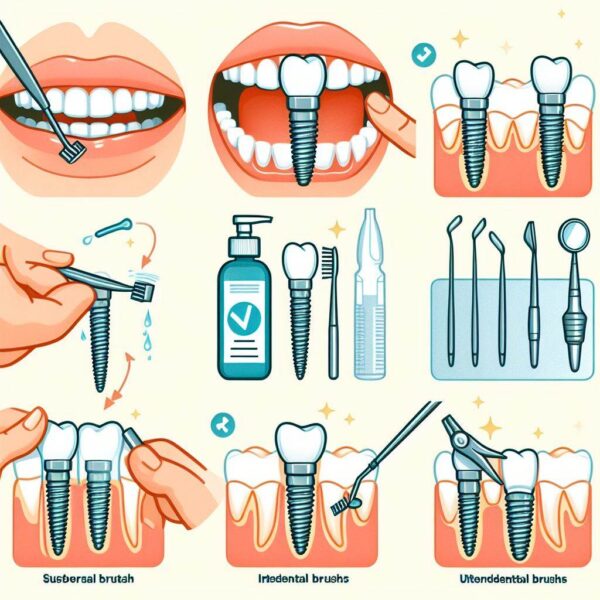
Maintaining proper oral hygiene is paramount for the long-term success of dental implants, ensuring their durability, functionality, and aesthetic appeal. While dental implants offer a durable and natural-looking solution for replacing missing teeth, they require specific care and cleaning techniques to prevent complications such as infection or implant failure.
Understanding the best practices for cleaning dental implants is essential for individuals seeking to preserve their oral health and maximize the lifespan of their implants. In this article, we’ll explore effective methods for cleaning dental implants, from daily oral hygiene routines to specialized tools and techniques.
By incorporating these strategies into their oral care regimen, individuals can promote optimal oral health and enjoy the full benefits of their dental implants for years to come.
Best Ways:
1. Brush Twice Daily:
Brush your teeth at least twice a day using a soft-bristled toothbrush and fluoride toothpaste. Gently brush all surfaces of the implant-supported restoration, including the crown, abutment, and surrounding gum tissue.
2. Use Interdental Brushes:
Incorporate interdental brushes or soft picks into your daily oral hygiene routine to clean between teeth and around the implant. These specialized tools help remove plaque and debris from hard-to-reach areas.
3. Floss Daily:
Use dental floss or implant-specific floss to clean between teeth and around the implant. Gently slide the floss between the implant and adjacent teeth, using a back-and-forth motion to remove plaque and food particles.
4. Rinse with Antimicrobial Mouthwash:
Rinse your mouth with an antimicrobial mouthwash to reduce bacterial buildup and maintain oral hygiene. Choose a mouthwash that is alcohol-free and suitable for use with dental implants.
5. Avoid Abrasive Products:
Avoid using abrasive toothpaste or cleaning products that may scratch or damage the surface of the implant or restoration. Opt for gentle, non-abrasive oral care products recommended by your dentist.
6. Attend Regular Dental Cleanings:
Schedule regular dental cleanings and check-ups with your dentist to monitor the health of your implants and receive professional cleaning to remove plaque and tartar buildup.
7. Consider Water Flossers:
Water flossers, also known as oral irrigators, can be effective for cleaning around dental implants and along the gumline. Use a low-pressure setting and an implant-compatible tip to avoid causing damage to the implant.
8. Maintain Overall Oral Health:
Practice good overall oral health habits, including eating a balanced diet, avoiding tobacco products, and staying hydrated to support the health and longevity of your dental implants.
9. Be Consistent:
Consistency is key to maintaining oral hygiene and preserving the health of your dental implants. Make cleaning dental implants a regular part of your daily oral care routine to ensure long-term success and optimal oral health.
What Are The Do’s And Don’ts After Dental Implants?

After undergoing dental implant surgery, adhering to proper post-operative care guidelines is essential for ensuring successful healing and optimal outcomes. Knowing the do’s and don’ts after dental implants can help individuals navigate the recovery process with confidence and minimize the risk of complications.
From managing discomfort to avoiding certain activities that may compromise the healing process, understanding these guidelines is crucial for promoting long-term implant success.
In this article, we’ll explore the key do’s and don’ts to follow after dental implant surgery, providing valuable insights into post-operative care practices that can enhance recovery and maximize the benefits of dental implants.
Do’s After Dental Implants:
Follow Post-Operative Instructions:
Adhere to the specific post-operative instructions provided by your dentist or oral surgeon, including guidelines for medication, oral hygiene, and activity restrictions.
Manage Discomfort:
Take prescribed pain medication as directed to manage discomfort and promote relaxation during the initial healing phase.
Practice Good Oral Hygiene:
Maintain good oral hygiene by gently brushing and flossing the teeth adjacent to the implant, being careful to avoid disturbing the surgical site.
Attend Follow-Up Appointments:
Keep scheduled follow-up appointments with your dentist or oral surgeon to monitor healing progress, address any concerns, and ensure proper integration of the implant with the surrounding tissues.
Eat Soft Foods:
Stick to soft, easily digestible foods during the first few days after surgery to minimize irritation to the surgical site and promote comfort.
Don’ts After Dental Implants:
Avoid Smoking:
Refrain from smoking and limit alcohol consumption, as these habits can impair circulation, delay healing, and increase the risk of complications.
Don’t Disturb the Surgical Site:
Avoid touching or disturbing the surgical site with your fingers, tongue, or other objects to prevent irritation, infection, or implant displacement.
Avoid Hard or Chewy Foods:
Steer clear of hard, crunchy, or chewy foods that may exert excessive pressure on the implants and surrounding tissues, potentially causing discomfort or complications.
Don’t Skip Oral Hygiene:
Maintain consistent oral hygiene practices, including brushing and flossing, to keep the surgical site clean and free of plaque and bacteria.
Limit Physical Activity:
Avoid strenuous physical activity, heavy lifting, or vigorous exercise during the initial healing period to minimize the risk of bleeding, swelling, and implant displacement.
Conclusion:
Caring for dental implants is essential for maintaining their longevity and ensuring optimal oral health. By following proper care guidelines and adopting good oral hygiene habits, individuals can protect their investment in dental implants and enjoy the benefits of a healthy, functional smile for years to come.
Regular dental check-ups, diligent oral hygiene practices, and lifestyle adjustments are key components of dental implant care. Remember to consult with your dentist for personalized recommendations and guidance tailored to your specific needs and circumstances.
With proactive care and attention, dental implants can provide a durable and reliable solution for tooth replacement, restoring confidence and enhancing overall quality of life.
FAQs:
Q1: How soon after dental implant surgery can I brush my teeth?
A: It is essential to wait until your dentist gives you the green light to resume brushing. Typically, gentle brushing around the surgical site can begin 24 hours after surgery, using a soft-bristled toothbrush.
Q2: Can I use regular dental floss to clean around my dental implants?
A: Yes, you can use regular dental floss to clean around dental implants. However, implant-specific floss or interdental brushes may be recommended for effectively cleaning hard-to-reach areas.
Q3: Are there any dietary restrictions after dental implant surgery?
A: In the initial days following surgery, it is advisable to stick to soft, easily chewable foods to minimize discomfort and promote healing. Avoid hard, crunchy, or sticky foods that may irritate the surgical site.
Q4: How often should I visit my dentist for check-ups after getting dental implants?
A: Regular dental check-ups are essential for monitoring the health and stability of dental implants. Your dentist will typically recommend follow-up appointments every 3 to 6 months to assess the condition of your implants and address any concerns.
Q5: Can dental implants get cavities like natural teeth?
A: While dental implants themselves cannot develop cavities, it is still crucial to maintain good oral hygiene to prevent gum disease and other complications that can affect the health of the surrounding tissues and implant stability.
